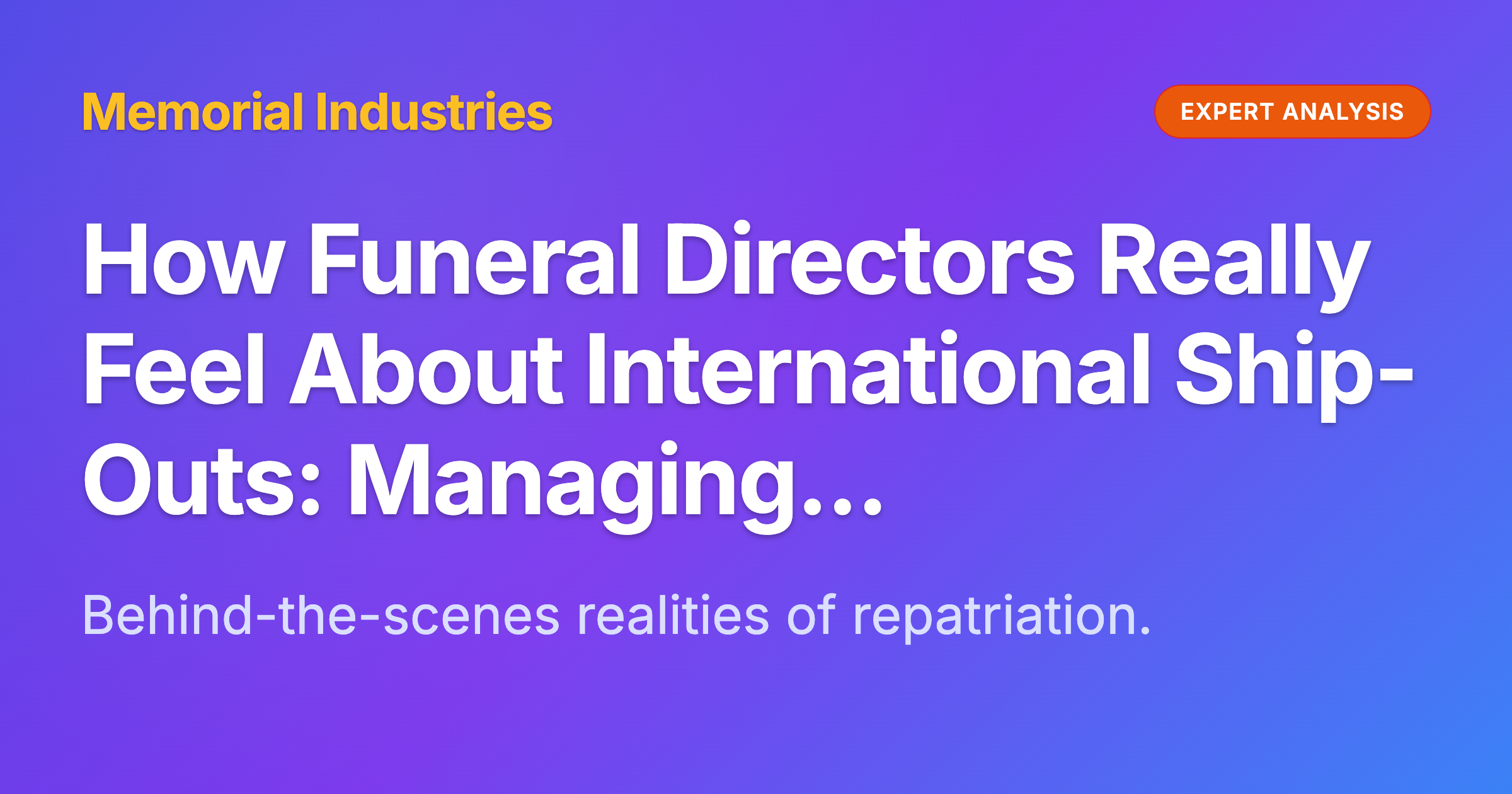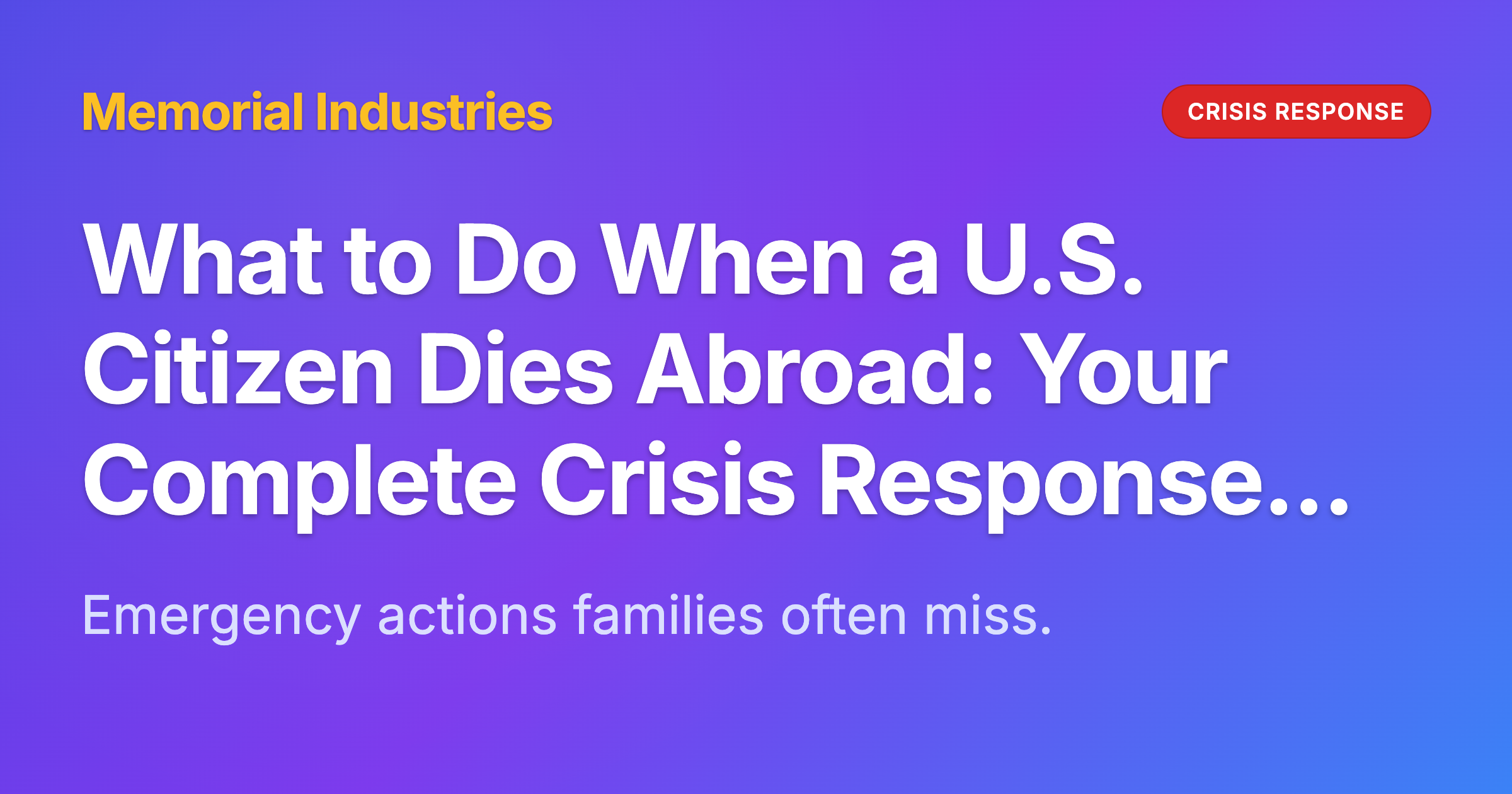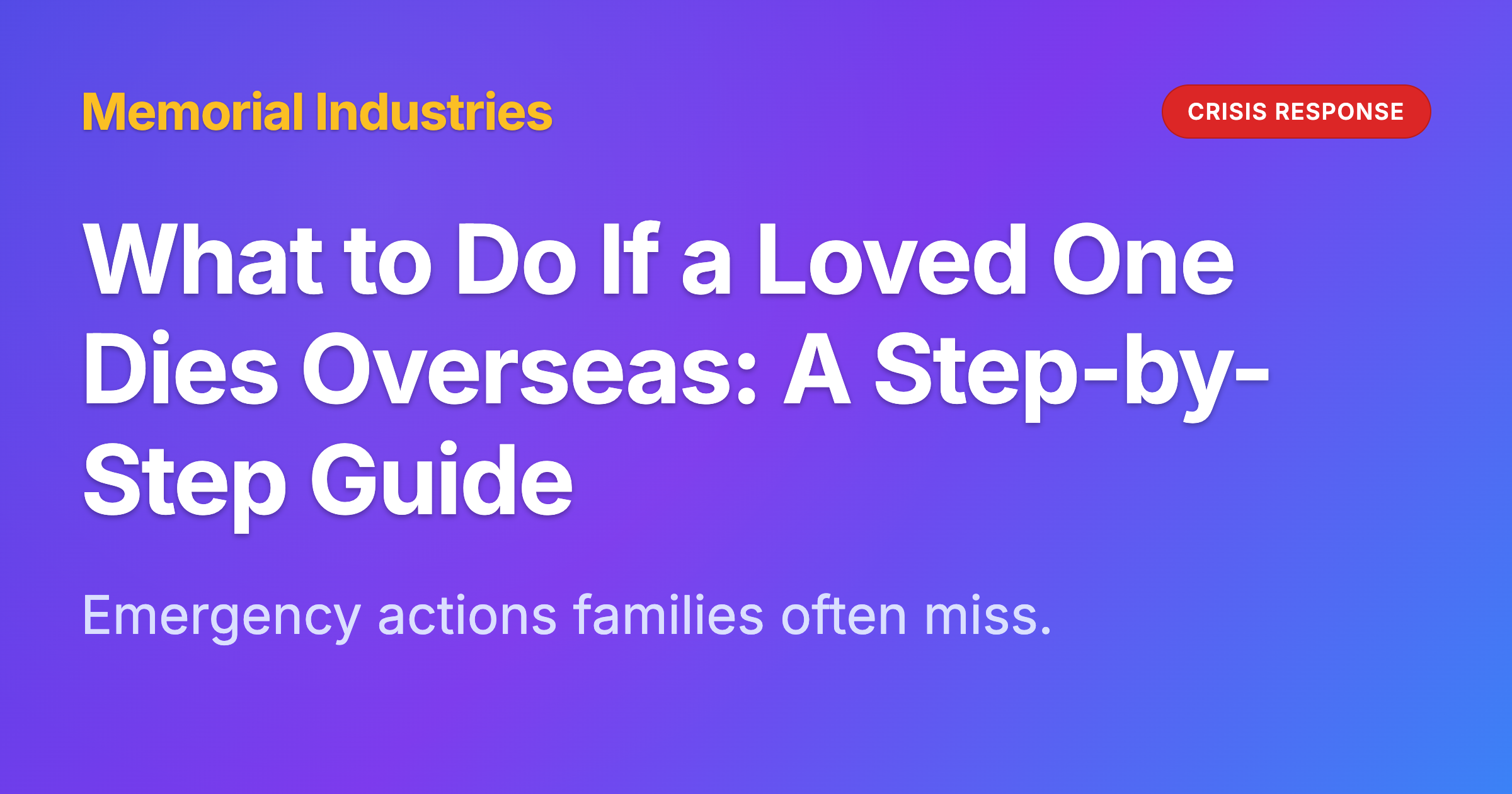
- Jan 20, 2025
- 45 min read
International Ship-Outs: A Funeral Director's Guide to Avoiding Critical Errors
The 2 AM call comes in. A family needs their loved one shipped to India. Your stomach drops. You’ve done this before, but each international ship-out feels like walking a tightrope without a net. One wrong document, one missed requirement, and everything falls apart.
If you’re a funeral director who breaks into a cold sweat at the mention of international repatriation, you’re not alone. This comprehensive guide addresses the reality of international ship-out anxiety and provides the practical systems that veteran directors use to manage these complex cases successfully.
The Reality of International Ship-Out Anxiety for Funeral Directors
Understanding Why International Ship-Outs Create Paralyzing Fear
International ship-outs trigger a unique form of professional anxiety that most funeral directors rarely discuss openly. Unlike local services where you control the timeline and process, international repatriation places you at the mercy of multiple government agencies, airline cargo departments, and consular officials who may or may not return your calls.
The psychology behind “one clerical error” anxiety is rooted in reality. A single missing stamp, an incorrectly formatted death certificate, or a translation from the wrong type of certified translator can derail an entire shipment. Families, meanwhile, are grieving and desperate to get their loved one home immediately. They don’t understand why it takes days to gather documents or why the consulate is closed for a holiday they’ve never heard of.
Coordinating with unresponsive consulates becomes a full-time job. You call the published number and get voicemail. The website hasn’t been updated since 2018. The requirements listed conflict with what the airline told you. Meanwhile, the family calls every few hours asking for updates you don’t have. You’re carrying not just their grief but their expectations, their cultural obligations, and often their extended family’s scrutiny from halfway around the world.
The weight of this responsibility manifests physically. Directors report lying awake at 3 AM, mentally reviewing document checklists. Did you get enough certified copies? Was that stamp in the right color ink? The Egyptian consulate requires blue ink, but did they mean blue ballpoint or blue fountain pen? These details that would seem absurd in any other context become make-or-break factors in international shipping.
What Directors Really Experience During These Cases
The reality of managing international ship-outs goes far beyond paperwork stress. Directors describe it as “high-wire work without a net” – one wrong move and there’s no safety mechanism to catch you. Unlike a local burial where you might quickly correct a minor oversight, international errors compound into multi-day delays that devastate families.
Sleep loss becomes routine during these cases. You wake at 2 AM to call a consulate in a different time zone. You check your email obsessively, waiting for document approvals. Even when you’re not actively working the case, your mind churns through contingencies. What if the airline rejects the shipment? What if the connecting flight gets canceled? What if the documentation that worked last time has new requirements?
Imposter syndrome hits particularly hard with international cases. You’re expected to be the expert, guiding families through this complex process, yet you often feel like you’re barely keeping ahead of the requirements yourself. When a family asks confidently, “You’ve done this before, right?” you say yes, even though your last shipment to their country was three years ago and everything has probably changed.
The physical symptoms of this stress are real and documented. Directors report chronic headaches during international cases, stomach issues that flare up when dealing with difficult consulates, and tension that settles into shoulders and neck. One director described developing a eye twitch that only appeared during international shipments – a physical manifestation of the constant vigilance these cases require.
How International Cases Differ from Regular Services
The fundamental difference between local and international cases isn’t just complexity – it’s control. With a local service, you’re the conductor of the orchestra. You set the schedule, coordinate the vendors, and manage the timeline. If something goes wrong, you have relationships and resources to fix it quickly.
International cases flip this dynamic entirely. You become dependent on bureaucracies you don’t understand, in languages you might not speak, following procedures that seem to change without notice. A local burial might involve three or four authorities; an international shipment can require approval from a dozen different agencies across multiple countries.
Timelines become particularly frustrating. Families accustomed to American funeral practices expect services within days. They don’t understand why you need two weeks to gather documents, or why the consulate takes five business days to process paperwork. “But they died on Monday,” a family member might say, “Why can’t they be home by Friday?” Explaining international bureaucracy to grieving families while managing your own anxiety about meeting their expectations becomes an exhausting emotional labor.
The multiple authorities involved create a maze of requirements that often conflict. The airline says one thing, the consulate another, and the destination country’s customs department something else entirely. You become a diplomat, negotiating between entities that don’t communicate with each other, trying to find a path that satisfies everyone’s requirements while the clock ticks and the family waits.
The Professional Isolation Factor
Perhaps the most challenging aspect of international ship-out anxiety is the isolation. Most funeral directors have limited experience with these cases. Your colleagues might handle local services expertly but freeze when faced with international documentation. You can’t simply ask the director down the street how they handle Venezuelan consulate requirements – they’ve probably never dealt with it either.
Funeral school provides minimal training on international repatriation. You might get a single lecture, a brief mention in a textbook, but nothing that prepares you for the reality of managing these cases. The first time you face an international shipment, you’re essentially self-taught, learning through trial and error with someone’s loved one and a family’s trust at stake.
This creates a vicious cycle of isolation. You’re figuring it out alone, afraid to admit uncertainty because families need you to be the expert. You can’t show vulnerability to your staff who look to you for guidance. You maintain a facade of competence while internally scrambling to understand constantly changing requirements.
The pressure to appear competent extends beyond just the immediate family. International cases often involve extended family networks, religious communities, and cultural organizations. Your reputation isn’t just on the line with one family but potentially with an entire community. One badly managed shipment can damage relationships you’ve spent years building.
Essential Resources That Actually Work (Beyond the Red Book)
Maximizing the Red Book - Your Foundation Resource
The NFDA’s International Shipping manual, commonly called “the Red Book,” serves as the industry’s primary reference for international requirements. However, veteran directors know it’s a starting point, not gospel. The book provides a framework, but treating it as your only resource is a recipe for shipment failures.
The key to using the Red Book effectively is understanding its limitations. Requirements change faster than print editions can keep up. A country might update its documentation requirements monthly, but the Red Book is updated annually at best. Use it to understand the general framework of what’s required, then verify every detail with current sources.
Cross-referencing with consulate websites becomes essential, though these sites vary wildly in quality and currency. The German consulate might have detailed, updated requirements in perfect English. The consulate for a smaller nation might have a single page last updated in 2015, half in broken English, with dead links and phone numbers that no longer work.
Building your own supplementary notes transforms the Red Book from a static resource into a living document. After each shipment, add handwritten notes in the margins. “Morocco actually requires 12 copies, not 8.” “Philippine consulate in Chicago answers phones 2-4 PM only.” “French documents must be less than 3 months old, despite what book says.” These notes become invaluable for future shipments.
Some directors create a digital companion to their Red Book, scanning pages and adding digital annotations that can be updated instantly. This allows you to share updated information with staff and maintain a backup of your accumulated knowledge. The combination of the Red Book’s structure and your real-world updates creates a resource that actually reflects current requirements.
Creating Your International Ship-Out “War Room”
Successful international shipping requires more than just reference materials – it requires a system. Directors who handle these cases regularly often create a dedicated space or resource center specifically for international shipments. This isn’t just organization; it’s anxiety management through preparation.
The physical binder system remains surprisingly effective in our digital age. Create a binder for each country you ship to regularly. Include successful documentation from previous shipments, photos of properly completed forms, examples of accepted translations, and copies of approval letters. When panic sets in at 10 PM, being able to physically flip through successful examples provides both practical guidance and psychological reassurance.
Country-specific requirement sheets go beyond what any manual provides. These are your personal cheat sheets, developed through experience. “Italy: Apostille required on ALL documents, not just death certificate. Processing time: 10-12 business days. Contact Maria at consulate, not general number. She answers emails within 24 hours. Avoid shipping December 15-January 10 due to holidays.”
Consulate contact cards with names and direct numbers become more valuable than gold. The general consulate phone number might ring endlessly, but Maria’s direct line gets answered. Building these contact lists takes years, but each verified contact reduces anxiety exponentially. Include notes about communication preferences: “Ahmed prefers WhatsApp to email.” “Susan only available Tuesdays and Thursdays.” “Carlos speaks perfect English despite what website says.”
Airline acceptance charts organized by route and aircraft type prevent last-minute rejections. Not all planes can carry human remains. Some routes have temperature restrictions. Others have weight limitations. Creating a matrix of airlines, routes, and aircraft types that have successfully accepted shipments eliminates guesswork when booking cargo space.
Building Relationships That Save Shipments
The difference between a smooth shipment and a nightmare often comes down to relationships. The consulate employee who recognizes your voice and trusts your documentation. The airline cargo supervisor who will hold space for you. The translator who will rush a document when you’re against a deadline.
Finding the right person at each consulate requires patience and persistence. Call at different times to reach different staff members. Note who is helpful and who creates obstacles. Some consulates have that one person who actually understands the requirements and can guide you through problems. Cultivate these relationships carefully. Send thank you notes. Remember their names. These connections become lifelines during difficult shipments.
Developing cargo contacts at airlines requires similar relationship building. Cargo departments are often understaffed and overwhelmed. The person who takes time to explain their specific requirements, who doesn’t treat you like an inconvenience, becomes invaluable. Learn their systems. Understand their pressures. When you make their job easier, they’re more likely to help when you need flexibility.
Creating reciprocal referral relationships with directors in other cities multiplies your resources. The director in Los Angeles who handles Korean shipments regularly. The one in Miami who knows every Latin American requirement. The colleague in New York who has connections at every consulate. These relationships create an informal network of expertise that no manual could provide.
Maintaining contacts through non-crisis communication keeps relationships warm. Don’t only call when you need something. Check in periodically. Share updates about requirement changes you’ve discovered. Forward relevant information. When you do need urgent help, you’re calling a colleague, not a stranger.
Digital Tools and Backup Systems
While physical resources and relationships form the foundation, digital tools provide crucial support for international shipments. Knowing which consulate websites actually provide useful information saves hours of frustrated searching. Bookmark the good ones. Note which ones are regularly updated versus those that haven’t changed since 2010.
Phone apps for international time zones prevent embarrassing and frustrating calls at inappropriate hours. Some directors use apps that show multiple time zones simultaneously, with indicators for business hours and holidays. Translation apps, while imperfect, can help you understand foreign-language consulate websites or decode requirements written in bureaucratic language.
Cloud storage for backup documentation provides peace of mind and practical recovery options. Scan every document before sending. Store copies in multiple locations. When a consulate claims they never received documents you know you sent, having digital copies with transmission confirmations can save the shipment. Some directors maintain shared drives with their staff, ensuring someone can always access critical documents.
Flight tracking tools for monitoring cargo transform anxiety into information. Instead of wondering where the shipment is, you can see it moving through the system. You can update families with concrete information. When delays occur, you know immediately and can begin managing expectations and making alternative arrangements.
Preventing the Clerical Errors That Cause Shipment Failures
The “Triple Everything” Documentation Strategy
Veteran directors have learned through painful experience that when it comes to international documentation, “probably overkill” becomes your safety net. The cost of extra copies pales compared to the cost of a rejected shipment. This isn’t paranoia; it’s protection born from experience.
The death certificate quantity calculation follows unwritten rules that no manual explains. The consulate says they need three copies. The airline wants two. Customs in the destination country will demand four. The family wants five for their own purposes. Order fifteen. The extra cost is insurance against delays that would cost far more in time, stress, and family distress.
One director tells the story that has become legend in international shipping circles: “I once had a shipment held at customs because the officer wanted to keep the deceased’s passport as a ‘souvenir.’ We had no copies. The family was devastated. The delay was a week while we got emergency passport copies from the State Department.” Now, this director makes five color copies of every passport, stores them in different locations in the shipment documentation, and keeps digital copies as backup.
Passport copy protocols have evolved from these hard lessons. Copy the biographical page, any valid visas, and entry stamps. Make color copies when possible – some countries reject black and white. Store copies in multiple locations: with the consulate documents, with the airline paperwork, taped inside the shipping container, and in your files. What seems like paranoid redundancy becomes wisdom when you’re standing at cargo trying to convince an airline agent to accept a shipment.
The systematic approach to documentation means treating every piece of paper as irreplaceable because, in the moment, it often is. Create a staging area where documents are assembled, checked, and rechecked. Use a checklist that you physically mark off – digital checklists are too easy to skip through when you’re stressed. Have a colleague verify your work. Then verify it again yourself.
Systematic Error Prevention That Actually Works
The three-stage verification process has saved countless shipments from rejection. First stage: document gathering and initial review. Second stage: independent verification by another staff member. Third stage: final review against the checklist before submission. This might seem excessive for domestic arrangements, but for international shipments, it’s the minimum acceptable standard.
Using your accumulated “phone book” of requirements as a checklist system means never trusting memory when stressed. Even if you’ve shipped to France twenty times, use the checklist. Requirements change. Your memory under pressure isn’t reliable. The checklist is your external brain, maintaining consistency when anxiety might cause you to forget crucial details.
Pre-submission document staging involves creating a physical space where completed documents are arranged in submission order. This isn’t just organization – it’s a visual verification system. When you can see all documents laid out, gaps become obvious. Missing stamps stand out. Inconsistencies in dates or names become apparent. This physical manifestation of readiness provides psychological comfort and practical verification.
Final airport inspection protocols separate successful shipments from cargo hold rejections. Arrive early. Very early. Bring extra copies of everything. Have phone numbers for every authority who might need to be contacted. Inspect the container sealing. Verify the documentation packet is properly attached. Take photos of everything. These final moments determine whether months of work succeed or fail.
Understanding What Really Gets Shipments Rejected
Missing stamps versus wrong stamps represents a critical distinction that experience teaches harshly. A missing stamp might be added with some diplomatic persuasion. A wrong stamp – the wrong color, wrong position, wrong authority – often means starting over. Understanding which elements have flexibility and which are absolute has taken the industry years of collective failures to learn.
Translation requirements seem straightforward until you’re dealing with certified translator qualifications that vary by jurisdiction. The translator certified in your state might not be recognized by the destination country. Some countries require translation of every word on every document, including the printed headers on official forms. Others only want specific sections translated. These nuances aren’t published anywhere; they’re learned through rejection and correction.
Airline-specific restrictions change without notice and often without logic. An airline that accepted shipments on Tuesday might reject identical documentation on Thursday because they’ve updated their internal policies. They’re not obligated to notify you of changes. Building relationships with cargo supervisors who will alert you to policy updates becomes essential for preventing last-minute rejections.
Aircraft model limitations represent a hidden minefield in international shipping. Not all aircraft can carry human remains. Some have temperature control limitations. Others have cargo hold configurations that don’t accommodate caskets. The cargo agent booking your shipment might not know these restrictions. You discover them when you arrive at the airport and are told the aircraft scheduled for that route can’t accept your shipment.
Last-minute government requirement changes have destroyed carefully planned shipments. A country implements new health documentation requirements overnight in response to a disease outbreak. A political situation triggers enhanced security screening. A holiday you didn’t know about means offices are closed when you need final approvals. Building buffer time into every estimate isn’t pessimism; it’s realism based on accumulated experience.
Managing Anxiety and Professional Stress
Practical Coping Strategies from Veteran Directors
The world map tracking system has become a powerful tool for managing international shipping anxiety. Directors who handle regular international cases often maintain a large world map in their office, marking each successful shipment with a pin or flag. This visual reminder of past successes provides perspective during challenging cases. When you’re struggling with a shipment to Poland, seeing the pin from last year’s successful Polish repatriation reminds you that the system does work, that you have succeeded before, and that this current challenge is surmountable.
Building peer support networks within the industry has transformed how directors handle the stress of international cases. Online forums, private Facebook groups, and WhatsApp chains connect directors facing similar challenges. At 11 PM, when you’re panicking about Egyptian documentation requirements, someone in your network has likely faced the same situation. These connections provide both practical solutions and emotional support from people who truly understand the pressure.
War story sharing serves a purpose beyond entertainment at conventions. Each story of shipment disasters and recoveries contains lessons. The director who had a shipment rejected three times before discovering the consulate wanted documents in landscape orientation, not portrait. The one who learned that certain countries require the deceased’s photo to be attached with exactly four corners of tape, not glue or staples. These stories, shared over coffee or late-night texts, build collective knowledge that no formal training provides.
Recognizing you’re not alone in the struggle has profound psychological benefits. Every director managing international shipments faces the same fears, the same late-night anxiety, the same imposter syndrome. When a respected colleague admits they still get nervous before every international case, even after twenty years, it normalizes your own anxiety. This isn’t weakness; it’s an appropriate response to genuinely challenging work.
Setting Family Expectations That Protect Everyone
The “no guaranteed timelines” conversation might be the most important discussion you have with families. This isn’t about avoiding responsibility; it’s about honest communication that prevents devastating disappointment. Explain that international repatriation involves multiple government agencies, any of which could cause delays. Use specific examples: “The consulate might take 3-5 business days, but if there’s a national holiday, it could be longer.” This transparency, delivered with compassion, helps families prepare emotionally for potential delays.
Explaining airline acceptance realities upfront prevents the crushing disappointment of last-minute rejection. Families often don’t understand that booking cargo space doesn’t guarantee acceptance. The airline reserves the right to refuse shipments that don’t meet their requirements, even if those requirements weren’t clearly communicated initially. Having this conversation early, while difficult, prevents the trauma of telling a family at the airport that their loved one can’t fly today.
Helping families understand route limitations requires cultural sensitivity and clear communication. The direct flight they assume exists might not carry cargo. The route might require connections through countries with their own documentation requirements. Weather, aircraft changes, or political situations might force route changes. When families understand these complexities from the beginning, they’re better equipped to handle changes if they occur.
The flexibility conversation that prevents later conflict involves explicitly discussing what decisions might need to be made quickly. “If the Thursday flight is full, do we wait until Monday or route through another city?” “If the consulate requires additional documentation, do we proceed even if it delays the shipment?” Having these conversations when families are calmer, rather than in crisis moments, leads to better decisions and less conflict.
Protecting Your Team’s Mental Health
Recognizing stress signs in staff requires active observation and open communication. The assistant who normally handles international paperwork cheerfully but has become withdrawn. The colleague who’s making unusual errors on routine tasks. The team member who’s staying hours after closing to triple-check documents. These behavioral changes signal stress that, left unaddressed, can lead to burnout or costly mistakes.
Clear responsibility delegation prevents the entire weight of international cases from falling on one person. Assign specific tasks: one person handles consulate communication, another manages airline bookings, a third oversees documentation. This distribution not only reduces individual stress but creates redundancy if someone is unavailable. It also allows team members to develop expertise in specific areas, building confidence and competence.
Regular team check-ins during international cases provide opportunities to address problems before they become crises. A brief morning meeting to review where things stand, what’s needed today, and who needs help. An end-of-day debrief to discuss what was accomplished and what challenges remain. These touchpoints catch issues early and remind everyone they’re part of a team effort.
Celebrating successes becomes essential for maintaining morale when handling stressful international cases. When a difficult shipment finally departs, acknowledge the team’s effort. Share positive feedback from families. Create a tradition – perhaps a special lunch after each successful international case. These celebrations balance the stress with recognition, reminding everyone why this difficult work matters.
Real Director Experiences - What Actually Happens
Success Stories That Build Confidence
The France shipment that one director describes as “one of the hardest I’ve done” has become a teaching case for managing complexity. The deceased was a dual citizen with documentation in multiple languages. The family was split between those who wanted cremation and those demanding burial. French authorities required documents that didn’t exist in the American system. Yet through careful diplomacy, creative problem-solving, and leveraging every relationship, the shipment succeeded. The director keeps a photo of the sealed container on their desk – a reminder that even the “impossible” cases can work.
When over-preparation saves the entire shipment, it validates every extra step taken. One director recalls arriving at cargo with what seemed like excessive documentation – fifteen copies of everything, translations in three languages, letters from authorities who weren’t technically required. When the cargo agent unexpectedly demanded documentation that wasn’t on any checklist, they had it. The shipment that would have been delayed for days proceeded on schedule. The family never knew how close it came to failure.
Last-minute consulate relationships paying off demonstrates why maintaining these connections matters. A director recalls calling a consulate at 4:45 PM on Friday, desperate for a signature that would allow a Monday shipment. The official line was that processing took 5-7 business days. But because this director had built a relationship with a specific consular officer, had always been professional and prepared, that officer stayed late on a Friday to process the documentation. The shipment departed on schedule.
The satisfaction of taping final documents to the container represents more than just a procedural step. It’s the physical manifestation of weeks of work, stress, and problem-solving. Directors describe this moment with unexpected emotion – the relief, the pride, the exhaustion all crystallizing as you smooth that last piece of tape. One director photographs every sealed container, creating a visual record of success that provides comfort during future challenging cases.
Common Failure Points and Recovery Stories
Document rejections and the 2-5 day delay reality have taught directors to build buffers into every timeline. A consulate rejects documents for formatting issues that weren’t specified in any requirements. The re-submission process means starting over, losing your place in the queue. Families who were told “probably Thursday” now face “definitely not until next Tuesday.” Managing this disappointment while maintaining your own composure requires professional fortitude that funeral school never taught.
Managing family communication during setbacks becomes an exercise in balancing honesty with hope. You need to explain the delay without destroying their confidence in your competence. “The consulate has requested additional documentation” sounds better than “They rejected everything because the stamp was the wrong shade of blue,” even though both statements are true. Finding language that maintains family trust while acknowledging setbacks is an art developed through painful experience.
Airline rejections and scrambling for alternatives represent some of the most stressful moments in international shipping. You arrive at cargo with a family waiting at the destination. The airline refuses the shipment for reasons that seem arbitrary. Now you’re calling other airlines, checking alternative routes, recalculating costs, all while maintaining professional composure. One director describes spending six hours at the airport, making forty-seven phone calls, before finding an alternative routing. The family only knew there was “a minor delay with the airline.”
Route changes and family emotional responses reveal how destination matters beyond logistics. A direct flight to Seoul becomes a connection through Tokyo due to aircraft changes. For some families, this is a minor inconvenience. For others, particularly those with historical or political sensitivities, it’s deeply distressing. Managing these emotional responses while solving logistical problems requires cultural awareness and emotional intelligence that extends far beyond technical shipping knowledge.
The Learning Curve Truth
First few cases: completely overwhelming. Every director remembers their first international shipment with a mixture of pride and horror. The late nights researching requirements. The panic when the consulate phone just rang without answer. The relief when it actually worked. These early cases teach lessons that no training could provide, building foundation knowledge through trial by fire.
By the tenth case, pattern recognition begins. You start seeing commonalities across countries. Document requirements follow similar structures. Consulate processes have predictable rhythms. Airlines have consistent quirks. The overwhelming becomes merely challenging. You’re still anxious, but it’s managed anxiety rather than panic.
By the fiftieth case, confidence and mastery develop. Not arrogance – international shipping remains too complex for complacency. But genuine confidence based on accumulated experience. You know multiple solutions for common problems. You have relationships that can help navigate challenges. You’ve recovered from enough disasters to know that solutions exist even when situations seem impossible.
Why experience is the only real teacher becomes clear through this progression. No manual can explain the subtle tone that gets a reluctant consular officer to help. No training can replicate the problem-solving required when three agencies have conflicting requirements. No simulation can create the pressure of a real family depending on you to bring their loved one home. Each case adds to your repertoire of solutions, relationships, and confidence.
Building Systems That Reduce Risk and Anxiety
Advance Planning Protocols
The 48-72 hour airline booking reality has caught many directors off guard. Families assume that booking a cargo flight is like booking a passenger ticket – immediate and confirmed. The reality involves cargo space availability, documentation review, security clearances, and route planning that takes days, not hours. Building this timeline into your initial family conversations prevents the frantic rush that creates errors.
Temperature control planning for long routes requires understanding both aircraft capabilities and transfer conditions. A shipment to Australia might require multiple flight segments, each with potential temperature exposure during transfers. Some routes simply cannot maintain required temperatures during summer months. Having these conversations with families early, including potential seasonal limitations, prevents the devastating scenario of a shipment being rejected due to temperature concerns.
Seasonal flight schedule considerations affect more than just availability. Airlines reduce service to some destinations during off-peak seasons. Holiday periods might mean increased passenger traffic that limits cargo space. Weather patterns affect routing options. Building a calendar that notes these patterns for your common destination countries helps set realistic expectations and identify potential challenges before they become crises.
Building buffer time into all estimates isn’t pessimism – it’s professional wisdom. If everything goes perfectly, a shipment to Italy might take ten days. Tell the family fourteen to sixteen days. When it arrives in twelve days, you’re a hero. When unexpected delays push it to fifteen days, you’re still within the timeframe you set. This buffer protects both your reputation and the family’s emotional wellbeing.
Creating Redundancy in Every Process
Multiple consulate contact strategies mean never depending on a single communication channel. Email the general address and specific contacts. Call the main number and direct lines. Fax if they still accept it. Some directors even use certified mail for critical documents, creating a paper trail that proves submission. When one method fails, others might succeed.
Backup airline relationship development extends beyond your primary carrier. The airline you typically use might have mechanical issues, labor disputes, or sudden policy changes. Having established relationships with multiple carriers, even if you rarely use them, provides alternatives when primary options fail. These backup relationships require maintenance – occasional shipments to keep your account active, periodic communication to stay updated on requirements.
Document preparation redundancy systems assume something will go wrong and prepare accordingly. Create documents in multiple formats. Have physical and digital copies. Store copies in multiple locations. Have backup translators identified. Know multiple notaries with flexible schedules. This redundancy might seem excessive until the moment you need it, then it becomes invaluable.
Storage and retrieval protocols for emergencies mean anyone on your team can find critical documents instantly. Clear filing systems, both physical and digital. Naming conventions that make sense to everyone, not just you. Backup access protocols so documents aren’t trapped on one person’s computer. When you’re sick and your assistant needs to handle an urgent consulate request, these systems mean the difference between success and failure.
Knowing When to Refer Out or Partner
Recognizing complexity beyond your experience requires professional humility that protects both you and the families you serve. The shipment to a country you’ve never dealt with, involving religious requirements you don’t understand, with documentation in a language you can’t read. Sometimes the professional choice is acknowledging limitations and finding someone better equipped to handle the case.
Finding reliable specialist partners takes time but provides invaluable resources. The director who specializes in Muslim repatriations. The one with extensive Latin American experience. The colleague who handles Asian shipments exclusively. Building relationships with these specialists before you need them means you can offer families expertise even when it’s not your own.
Managing family expectations about referrals requires careful communication. Families chose you for a reason and might feel abandoned if suddenly referred elsewhere. Explain that you’re bringing in specialized expertise to ensure the best possible outcome. Offer to remain involved as a liaison. Make the introduction personally. This positions the referral as adding resources rather than abandoning responsibility.
Maintaining relationships for future collaboration means the referral relationship works both ways. The specialist you refer Korean shipments to might send you European cases. These reciprocal relationships build a network of expertise that benefits everyone, especially families who need specialized knowledge during their most difficult moments.
The Rewards That Make International Work Worthwhile
Why Directors Continue Despite the Stress
The profound meaning of bridging continents for families transcends the stress and complexity of international shipping. You’re not just moving a body; you’re completing a life journey. The immigrant who built a life in America returning to their birthplace. The student who died far from home being returned to grieving parents. These aren’t logistics exercises; they’re profound human experiences that you facilitate.
That final moment of completion and relief when a shipment successfully departs creates an emotional release unlike any other professional experience. Directors describe it as a physical sensation – tension leaving their shoulders, breath returning to normal, sometimes even tears of relief. The photo of the aircraft taking off, knowing you’ve successfully navigated weeks of complexity, provides a satisfaction that makes all the stress worthwhile.
Gratitude from families you may never meet again takes unexpected forms. The letter that arrives months later from a grandmother in India, translated by her granddaughter, thanking you for bringing her son home. The phone call from a cousin in Poland who wants you to know the entire village attended the funeral. The email with photos from the burial in El Salvador, showing hundreds of people who gathered because you made it possible. These moments of connection across continents remind you why this work matters.
Professional pride in mastering complex challenges develops differently than pride in routine success. Successfully managing a local funeral brings satisfaction. Successfully navigating international repatriation brings a deeper sense of accomplishment. You’ve done something most funeral directors can’t or won’t do. You’ve developed expertise that serves families in their most complex needs. This specialized competence becomes part of your professional identity.
Professional Growth and Expertise Development
Building specialized knowledge and reputation within the funeral service industry creates unique opportunities. You become the director other directors call for advice. Families seek you out specifically because of your international expertise. Your reputation extends beyond your local community to diaspora communities who know you can handle their unique needs.
Developing international professional networks connects you with colleagues worldwide. The funeral director in Tokyo who helps when you need information about Japanese requirements. The colleague in London who assists with UK documentation. These relationships extend your professional reach globally, transforming you from a local funeral director to an international repatriation specialist.
The unique expertise that sets you apart becomes a defining characteristic of your practice. In an industry where differentiation can be challenging, international shipping expertise provides clear distinction. You offer something valuable that many competitors can’t or won’t provide. This specialization can transform your business, attracting families who need these specialized services.
Opportunities for industry leadership and teaching emerge as your expertise develops. Speaking at conventions about international shipping. Writing articles for trade publications. Mentoring younger directors facing their first international cases. Your accumulated knowledge becomes a resource for the entire profession, establishing you as a thought leader in this specialized area.
Impact on Grieving Families and Communities
Reuniting loved ones with ancestral homeland carries profound cultural and spiritual significance. For many immigrant families, returning to the homeland for burial represents completing a sacred circle. The person who left seeking opportunity returns to rest with ancestors. You facilitate this completion, enabling families to fulfill cultural obligations that transcend borders.
Honoring deep cultural and religious traditions through international repatriation demonstrates respect that resonates throughout communities. When you successfully navigate the complex requirements to ensure a Muslim burial happens within prescribed timeframes, or when you manage to get a Hindu deceased to India for proper cremation rites, entire communities take notice. Your competence in managing these requirements shows respect for traditions that define cultural identity.
Multi-generational family healing and closure often depends on successful repatriation. The grandmother who can visit her child’s grave. The children who can bring flowers on death anniversaries. The extended family who can gather for traditional mourning rituals. These ongoing connections, made possible by your successful repatriation, support healing across generations and continents.
Your role in the most sacred family moments extends beyond logistics to spiritual facilitation. You’re not just shipping; you’re enabling families to honor their deceased according to their deepest beliefs. This sacred trust, successfully fulfilled despite overwhelming complexity, creates bonds that transcend professional relationships. Families remember not just that you helped, but that you made possible something they feared might be impossible.
Moving Forward with Confidence and Competence
Accepting the Inherent Challenge
Why international work will never be “easy” needs to be acknowledged and accepted. Requirements will continue changing. Governments will implement new policies without warning. Airlines will modify procedures. Consulates will interpret rules differently. This isn’t a problem to be solved but a reality to be managed. Accepting this inherent complexity reduces frustration and allows you to focus on developing systems that work within this challenging environment.
The difference between difficult and impossible becomes clear with experience. International shipping is undeniably difficult. Multiple authorities, changing requirements, cultural complexities, and logistical challenges make it one of the most complex aspects of funeral service. But it’s not impossible. Thousands of successful international shipments happen every year. Each one proves the system works, even when it feels overwhelming.
Building systems that create repeatability transforms chaos into manageable complexity. The checklist that ensures nothing is forgotten. The contact database that puts expert help within reach. The documentation templates that standardize processes. These systems don’t eliminate challenges, but they create a framework for managing them consistently. What once required panic-driven problem-solving becomes systematic execution of established protocols.
How experience transforms overwhelming into manageable reflects the power of accumulated knowledge. Your first international shipment might take 100 hours of work, countless phone calls, and sleepless nights. Your twentieth might take 30 hours of focused effort. Your fiftieth becomes routine enough that you can guide your staff through most of it. The challenges remain, but your capacity to manage them grows exponentially.
Practical Next Steps for Anxious Directors
Starting with simpler destination countries builds confidence without overwhelming complexity. Canada and Mexico, while international, have relatively straightforward requirements and responsive consulates. Western European countries generally have clear procedures and English-speaking contacts. Successfully managing these shipments builds confidence for tackling more complex destinations. Each success adds to your knowledge base and professional confidence.
Building your resource library methodically means dedicating time weekly to gathering information. Call one new consulate each week, even if you don’t have an immediate shipment. Update one country’s requirements in your files monthly. Collect business cards from every international contact. Subscribe to consulate newsletters and updates. This steady accumulation of resources means you’re prepared when that urgent call comes.
Finding mentors and learning from their experiences accelerates your learning curve dramatically. The director who’s been handling international cases for twenty years has made the mistakes you’re trying to avoid. They know which consulates are difficult, which airlines are reliable, which translators deliver on time. Their war stories contain lessons that could save you weeks of frustration. Reach out. Most experienced directors are happy to share knowledge with colleagues willing to learn.
Sharing your own lessons to help others completes the circle of professional development. Document your successes and failures. Share what you’ve learned at association meetings. Answer questions in online forums. Mentor newer directors facing their first international cases. This sharing not only helps others but reinforces your own knowledge and builds your reputation as someone who contributes to professional advancement.
The Bigger Picture Perspective
Every successful shipment proves the system works, despite its complexity and challenges. When you’re in the middle of a difficult case, drowning in paperwork and frustrated by unresponsive consulates, remember: this has been done before. Other directors have faced these same challenges and succeeded. The system, however imperfect, does function. Your current struggle is temporary, and success is achievable.
Your crucial role in families’ most difficult moments cannot be overstated. These families are navigating grief complicated by distance, bureaucracy, and cultural challenges. You stand as their guide through this complexity, their advocate with unfeeling bureaucracies, their source of hope when the system seems impossible. The technical skills you develop are important, but your role as compassionate facilitator during international crisis is irreplaceable.
Why this challenging work matters to communities extends beyond individual families. Diaspora communities depend on funeral directors who can manage international repatriation. Your expertise serves entire cultural groups, religious communities, and immigrant populations. When you develop this capability, you’re not just expanding your business services; you’re providing essential infrastructure for communities maintaining connections across continents.
The legacy you build through competent, caring service ripples through generations. The family whose grandmother you successfully repatriated tells that story for decades. Communities remember the funeral director who made possible what seemed impossible. Your reputation for managing these complex cases becomes part of your professional legacy, distinguishing your service in ways that transcend typical business metrics.
Conclusion: Embracing the Challenge
International ship-outs will always trigger some level of anxiety – that’s a sign you understand their complexity and take the responsibility seriously. But anxiety doesn’t have to mean paralysis. Through systematic preparation, relationship building, and accumulated experience, you can transform overwhelming challenges into manageable processes.
The directors who excel at international shipping aren’t necessarily smarter or calmer than their peers. They’ve simply developed systems, relationships, and experience that allow them to navigate complexity with confidence. They’ve accepted that perfection isn’t possible, but competence is achievable. They’ve learned that every shipment teaches lessons that make the next one easier.
Your journey with international shipping might begin with one terrifying case that keeps you awake for weeks. But with each success, you build knowledge, confidence, and capability. The impossible becomes possible. The overwhelming becomes manageable. And eventually, you become the director others call when they need help with their own international challenges.
The families you serve through international repatriation will likely never fully understand the complexity you navigated on their behalf. They won’t know about the 3 AM calls to consulates, the rejected documents you had to redo, or the airline supervisor you convinced to accept the shipment. They’ll simply know that during their most difficult time, when they needed to bring their loved one home across impossible distances and through incomprehensible bureaucracy, you made it happen.
That’s the ultimate reward of mastering international ship-outs: knowing that you can provide a service most can’t, solving problems others won’t touch, and reuniting families across continents when they need it most. The anxiety never fully disappears, but it becomes manageable. The complexity remains, but it becomes navigable. And the satisfaction of successfully completing these challenging cases makes every moment of stress worthwhile.
Remember: every pin on that world map represents not just a successful shipment, but a family reunited, a cultural obligation fulfilled, and a professional challenge conquered. Your expertise in this specialized area sets you apart, serves your community, and builds a legacy of service that transcends borders.
The next time that phone rings with an international case, take a deep breath. You have resources. You have systems. You have colleagues who understand. Most importantly, you have the capability to transform an impossible situation into a successful repatriation. The anxiety is real, but so is your ability to manage it and serve families in their most complex moments of need.

Related articles

Technology Transforming Death Care: Digital Solutions for Modern Challenges
Jan 15, 2025

What to Do When a U.S. Citizen Dies Abroad: Your Complete Crisis Response Guide
Sep 8, 2025

Should You Handle Repatriation Yourself? A Family's Critical Decision Guide
Aug 19, 2025

What to Do If a Loved One Dies Overseas: A Step-by-Step Guide
Jan 30, 2025

How to Bring a Body Home: Step-by-Step Guide
Jan 29, 2025

International Funeral Shipping Costs: Complete Breakdown
Jan 28, 2025